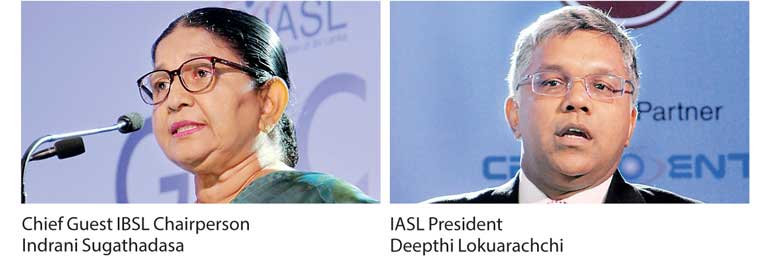Monday Feb 23, 2026
Monday Feb 23, 2026
Friday, 26 May 2017 00:10 - - {{hitsCtrl.values.hits}}


By Charumini de Silva
Reflecting on the substantial growth in general insurance penetration during the past six years, the insurance regulator yesterday called on the industry to invest considerably in the new age of business to ensure sustainable development.
Addressing the second General Insurance Sales Congress (GISCO) themed ‘Sustainability through Innovation’, Insurance Board of Sri Lanka (IBSL) Chairperson Indrani Sugathadasa stressed that persistence of insuring the public for improved services compels industry players to revamp the way in which services are being provided.
Last year the general insurance sector recorded a growth of 14.73% while generating a Gross Written Premium (GWP) of Rs. 79.5 billion compared to Rs. 69.3 billion in 2015. Out of this total GWP, motor insurance grabbed the larger share of the pie, constituting around 66% while fire insurance remained low at around 10% and miscellaneous, which includes health insurance, amounted to only 25%.
Currently, out of 29 insurance companies, 17 companies are engaged in the general insurance business, where the industry has seen an upward trend during the last five to six years.
Noting that these figures show general business is over-reliant on motor insurance, she emphasised that it was time the industry focused more on the other classes of business as there was scope and potential to achieve higher growth in this segment.
“I am aware that areas such as health insurance are not very profitable. However, I encourage the companies to use these classes as door-openers to promote other types of insurance. Do not put all your eggs in one basket,” Sugathadasa told to a room full of risk experts. Acknowledging the complexity of the insurance business, she urged industry players to invest considerably in order to understand such a business. “We know that any business cannot overlook innovation in order to succeed. New product development and product diversification are essential parts of innovation, but it needs to be done after identifying the needs of different community groups.” However, she asserted that along with product innovation, companies also needed to improve or replace time-consuming, ineffective business processes with efficient and productive ones to enable sales advisors to perform their jobs seamlessly. Highlighting the importance of increasing insurance penetration, Sugathadasa stressed the importance of using innovative mechanisms to reach out to untapped markets.
“How many companies are using university students to do research in these areas? How many members of your marketing team, product development or market research managers go out to the market and explore other sources of new technologies, innovative methods? How much do your companies invest in acquiring new knowledge in these areas? I would love to hear from the companies on what they are doing new to increase the penetration levels. And also let me know how the regulator can help more in this regard,” she questioned.
She said as the regulator for the insurance sector, one of the strategic goals of the IBSL, both from an economic and asocial perspective, was to ensure that the insurance industry operates effectively, remains competitive and retains the confidence of all stakeholders.
“It is our duty to provide a sound regulatory platform that facilitates growth, innovation, fair competition in the marker which protects policyholders and potential policyholders and helps maintain financial stability in the economy,” Sugathadasa stated.
Stating that the general insurance segment accounts for about 1.66% of total GDP, Insurance Association of Sri Lanka (IASL) President Deepthi Lokuarachchi said they had a major role and responsibility to uplift the level of dedication and contribution towards the national economy. He admitted that Sri Lanka’s level of penetration and engagement to the country’s GWP remains low compared to the rest of the countries from the region.
“It is up to the insurance companies to plan for the advancement of the industry to ensure that we achieve the level of growth and penetration where the industry can build and stand on its own feet as a sustainable economic vehicle that can offer protection for all,” Lokuarachchi added.
He further asserted that the potential opportunities for insurers in the telecommunications and banking sectors remained significantly underpenetrated.
Pix by Ruwan Walpola